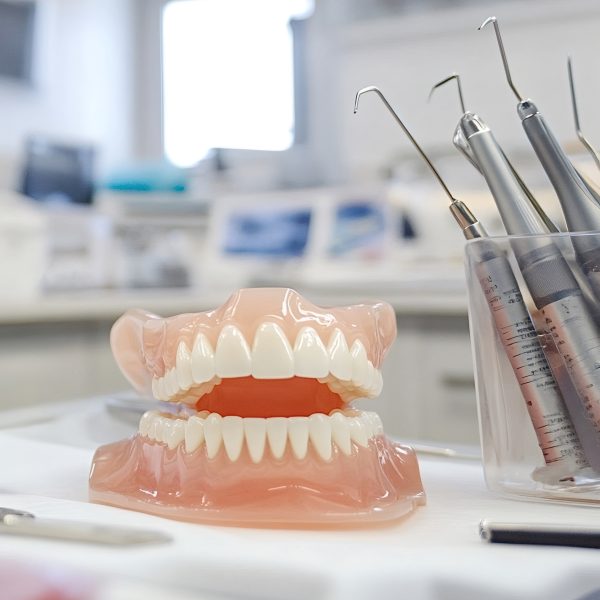Partial & Full Dentures
Dentures, also referred to as false teeth, are dental appliances utilized to replace missing teeth. Partial dentures replace one or several teeth, while full dentures replace all teeth on the upper and/or lower jaw.
Partial dentures can be removable or fixed. A removable appliance consists of a metal framework that uses clasps to attach to your natural teeth adjacent to the gap. Fixed partial dentures involve the use of dental implants to hold artificial teeth in place.
Full dentures are made up of a gum coloured base, with artificial teeth attached, that fit over your gums and bony ridges.
Partial dentures as well as conventional full dentures are placed in your mouth approximately 8 to 12 weeks after your teeth are removed and your gum tissues have healed. Alternatively, an immediate full or partial denture is prefabricated and inserted right after your natural teeth are removed and often needs to be refitted once your gums have healed. Full dentures are most commonly removable, but can also be fixed by implants.
Our team at Bearspaw Dental will help you choose the type of denture best suited to your needs and budget.

Denture Procedure
The procedure for receiving dentures varies depending on whether you require partial or full dentures, as well as whether the appliances will be removable or fixed.
During your first appointment, your dentist will examine your teeth, gums and supporting bone structure to determine an appropriate treatment plan. Impressions will be taken of your teeth and/or gums, which will be sent to a laboratory to custom-build your partial or full dentures.
Next, your natural teeth may be filed, contoured or extracted in preparation for your dentures, which will involve the use of a local anesthetic. Treatment options such as crowns and dental implants will be administered during future appointments. If the treatment plan is for immediate dentures, they will be placed after your natural teeth are extracted. Alternatively, conventional dentures will be fitted 8 to 12 weeks after your gums have healed.
Your dentist will provide instructions for how to care for your dentures and schedule follow-up appointments to ensure they continue to fit properly.
Risks & Complications
As with most dental treatments, there are potential risks and complications involved with dentures. You may experience pain, swelling and bleeding when teeth are extracted, dental implants are inserted or teeth are filed in preparation for dentures. These are common side effects that will decrease over time and can be treated by your dentist.
In rare cases, you could react to the local anesthetic administered during appointments. Follow the instructions of your dentist in the event of an allergic reaction.
If you receive partial dentures, there’s a possibility your teeth, crowns or bridges in contact with the denture could chip, fracture or collapse. Depending on the severity of the breakage, your teeth or dental restorations may need to be replaced.
Dentures may start to feel uncomfortable over time due to changes in your gum tissue. Your dentures may need to be refitted, relined or remade. Contact your dentist if you begin to experience any discomfort.
Full and partial removable dentures should be cleaned regularly and removed while you sleep. This enables saliva to bathe your gums, which is important for maintaining a healthy mouth. If you do not maintain your oral hygiene, you may experience bad breath, infections or other side effects.
Dentures are a popular treatment option to restore your smile and enable proper functionality. Contact our team at Bearspaw Dental today for more information and to book an appointment.

